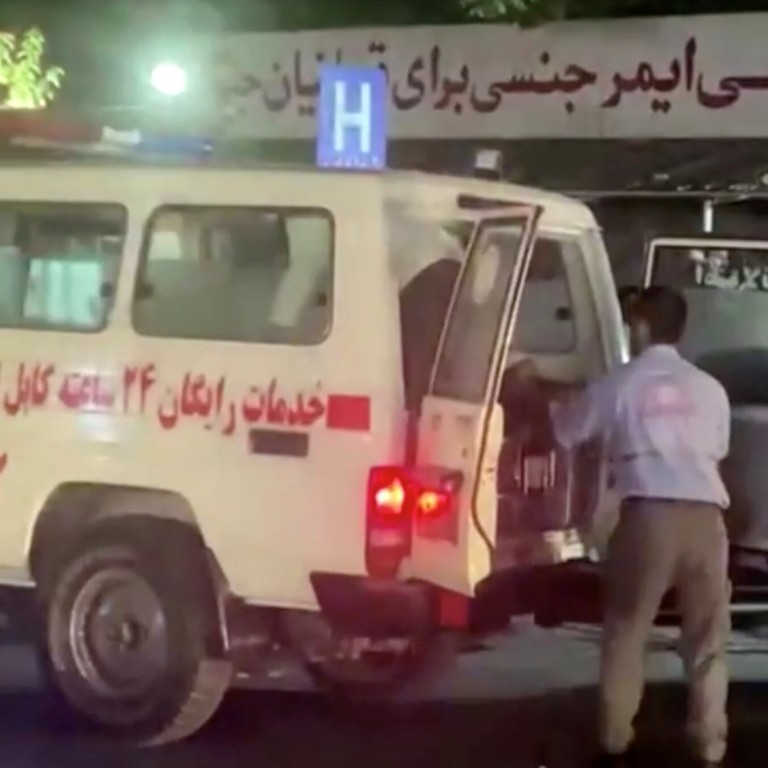
Afghanistan: Biden vows revenge after two Isis blasts outside Kabul airport kill dozens
- Thirteen US service members including marines were among the casualties,
- ‘We will hunt you down and make you pay,’ US president says
What is Isis-K in Afghanistan and how dangerous is the group?
The US defence department confirmed one explosion immediately outside the airport’s gate, where a suicide bomber detonated an explosive device as the individual was being assessed to board an evacuation flight, and a second explosion occurred near a hotel in the airport’s vicinity. Pentagon officials said on Wednesday that about 10,000 people were in the area.
“The threat from Isis is extremely real; we’ve been talking about this for several days,” Marine Corps General Kenneth McKenzie Jnr told reporters in Washington. “We saw it actually manifest itself here in the last few hours with an actual attack. We believe it is their desire to continue those attacks and we expect those attacks to continue, and we’re doing everything we can to be prepared for those attacks.”
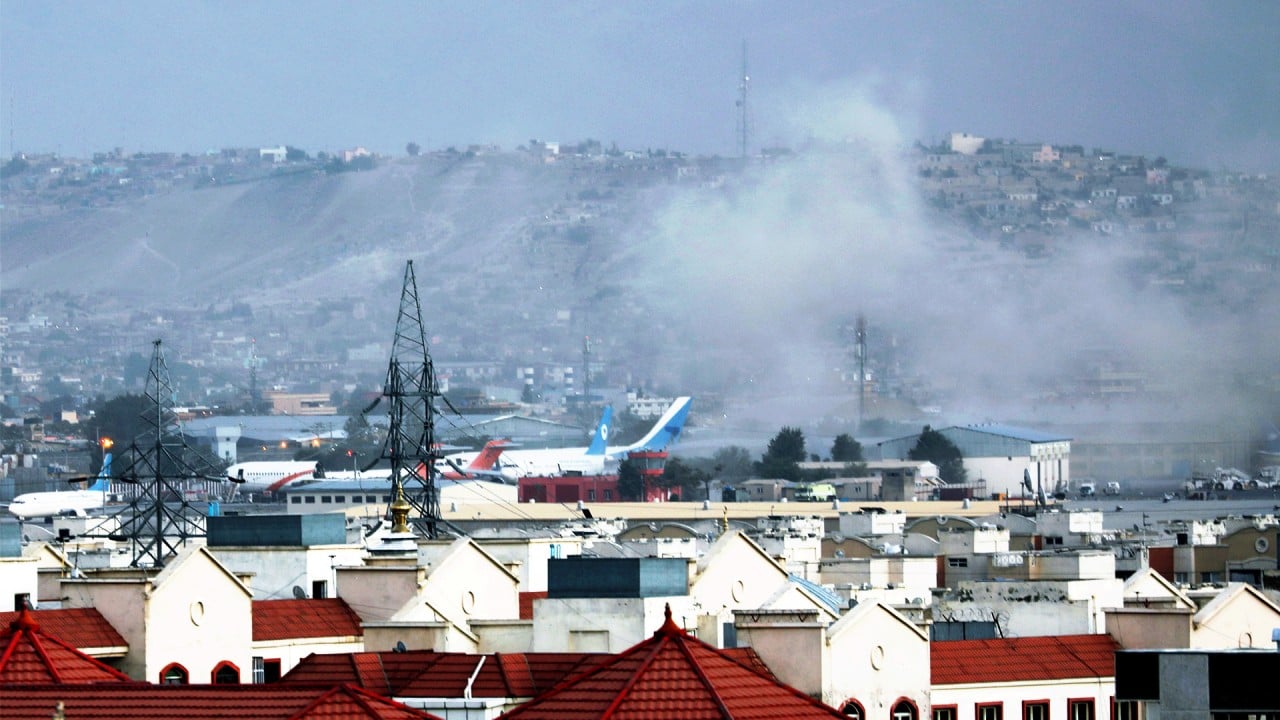
02:30
At least 60 killed by explosions outside Kabul airport, Afghan health official says
Biden held a press conference on Thursday evening, in which he warned that more attacks on the ground in Kabul were likely. He vowed to continue the US airlift and “respond with force and precision at our time at the place we choose in a moment of our choosing”.
“We will hunt you down and make you pay,” the US leader warned Isis militants before defending his administration’s decision to continue with the withdrawal from Afghanistan that the administration of his predecessor Donald Trump agreed to with the Taliban leadership, which controls most of the Central Asian nation.
The day’s violence was preceded by an alert on Wednesday by the US embassy in Kabul, which advised citizens to avoid travelling to the airport and said those already at the gates should leave immediately, citing unspecified “security threats”.
Britain’s Armed Forces Minister James Heappey said soon before the blasts that there was “very, very credible” evidence that Isis-K, a local Isis branch, was preparing to do something “spectacular” before the August 31 deadline for the US withdrawal from Afghanistan.
The Taliban, whose fighters are guarding the perimeter outside the airport, are enemies of the Afghan affiliate of Isis-K.
“Our guards are also risking their lives at Kabul airport, they face a threat too from Islamic State group,” said a Taliban official, who spoke on condition of anonymity and before the reports of the explosion.
Taliban takeover prompts US fears of a resurgent al-Qaeda
The White House, which cancelled a midday press conference, said earlier on Thursday that the total number of people evacuated from Kabul since the operation began on August 14 was 95,700, including 13,400 in the preceding 24 hours. The defence and state departments also cancelled briefings earlier on Thursday as details of the carnage trickled out.
Administration officials added that Biden met his national security team, including Secretary of State Antony Blinken, Defence Secretary Lloyd Austin, Chairman of the Joint Chiefs of Staff Mark Milley, and commanders on the ground.
The cabinet huddles and press event cancellations show an administration treading carefully to craft a consistent line during a disaster, and hoping to avoid alienating a Taliban it still wants to maintain some minimal contact with, said analysts.
“They don’t want to say something and seem incompetent,” said Sahar Khan, a Cato Institute research fellow. “And they don’t want to make it worse.”
Taliban’s return ‘boosts morale’ of militant groups in Southeast Asia
The jury is out whether this calamity will define Biden’s legacy – sapping political capital needed for infrastructure, China policy and other priorities – or whether memories will fade amid broad public support for ending this “never-ending” war.
“I am not sure that the Afghanistan story will dominate the news when there are fewer reporters there,” said Jon Alterman, senior vice-president at the Centre for Strategic and International Studies. “Afghanistan may come to resemble Yemen, a place where people know there is suffering but don’t follow at all closely.”
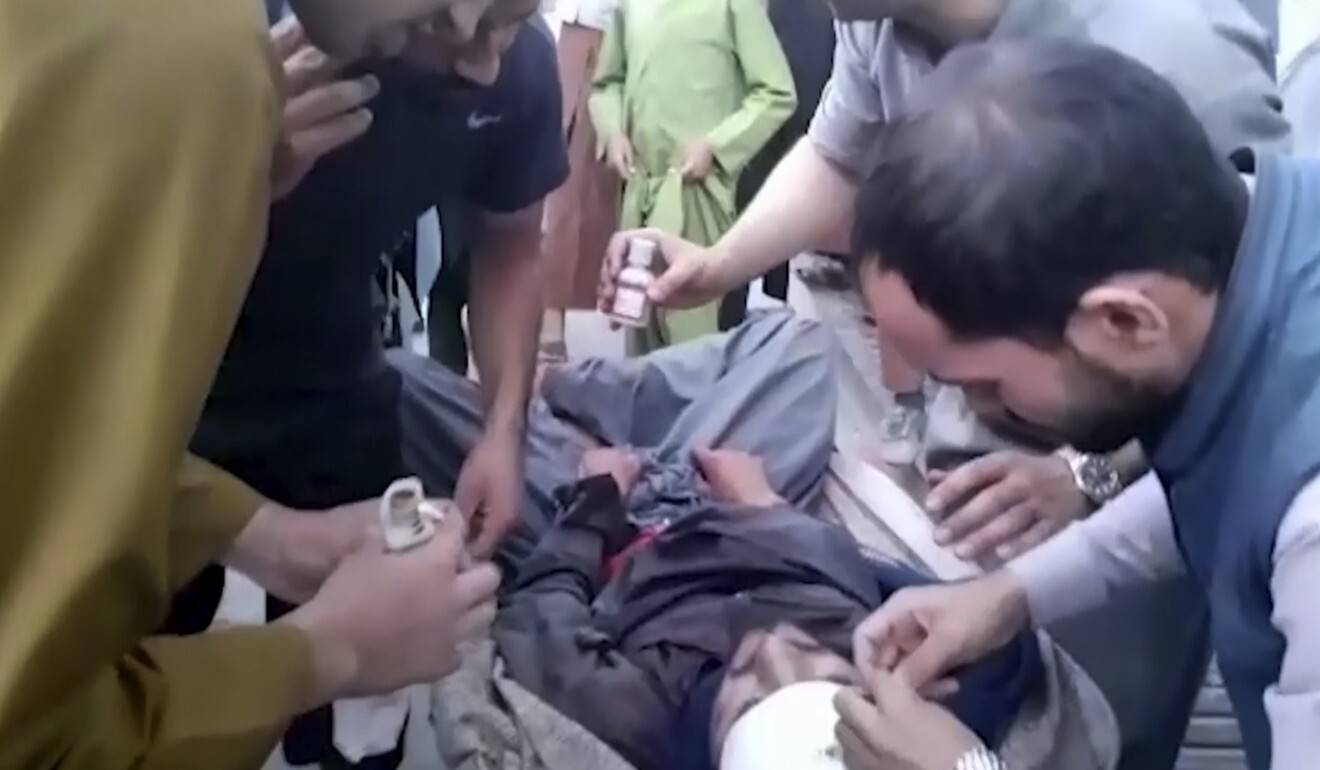
Although a reckoning of mistakes and causes is likely to take months and years, a few things are evident, analysts said.
One is that the US presence has masked many of the underlying factions, external meddling, power struggles and civil war that were there before events of September 11, 2001 and are now surging back, seen in Thursday’s airport attacks despite security assurances from top Taliban officials.
“The West tends to treat the Taliban as monolithic. But there are many groups, which is why taken it’s taken so long to negotiate,” said Khan. “The Taliban might not have as much control as they say they do.”
The disaster, political miscalculations and apparent surprise over the botched evacuation also suggests the US military, intelligence community and Biden administration are in need of a thorough investigation and house cleaning, some added.
“This is a crisis of competence,” said Dennis Wilder, a Georgetown University assistant professor and a former National Security Council director. “Damage has been done, and [Biden] will need to demonstrate lessons learned from this fiasco.”
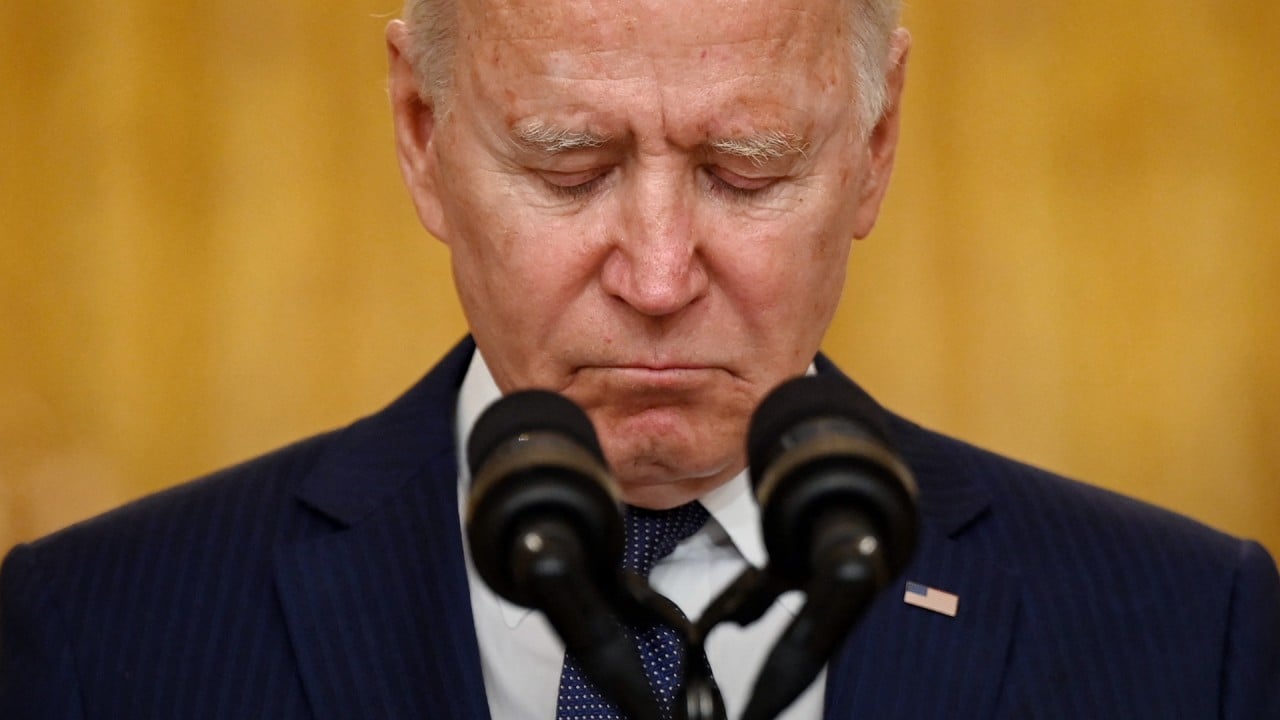
04:15
Taliban, US and allies condemn Kabul airport attack as end of Afghanistan evacuation nears
Concerns among allies over the gathering threats on the ground in Kabul have been underscored by a dwindling of international forces at the Kabul airport in recent days, owing to potential threats from Isis-K.
Turkey’s defence ministry said on Wednesday that it had started pulling troops out of Afghanistan, a 500-strong non-combat contingent that was stationed there as part of a Nato’s efforts to stabilise the country.
Canadian forces halted their evacuations of around 3,700 Canadian and Afghan citizens on Thursday, saying they had stayed as long as they could before the deadline lapses. US and allied troops also have to plan the logistics of their own withdrawal.
“We wish we could have stayed longer and rescued everyone,” the acting chief of Canada’s defence staff, General Wayne Eyre, told reporters.
Belgium ended its evacuation operations because of the danger of an attack. The Netherlands said it expected to carry out its last evacuation flight on Thursday.
British Prime Minister Boris Johnson said that his country’s airlift would continue “until the last moment”.
“We are able to continue with the programme in the way we have been running it, according to the timetable that we have got,” Johnson said in an emergency meeting in London.
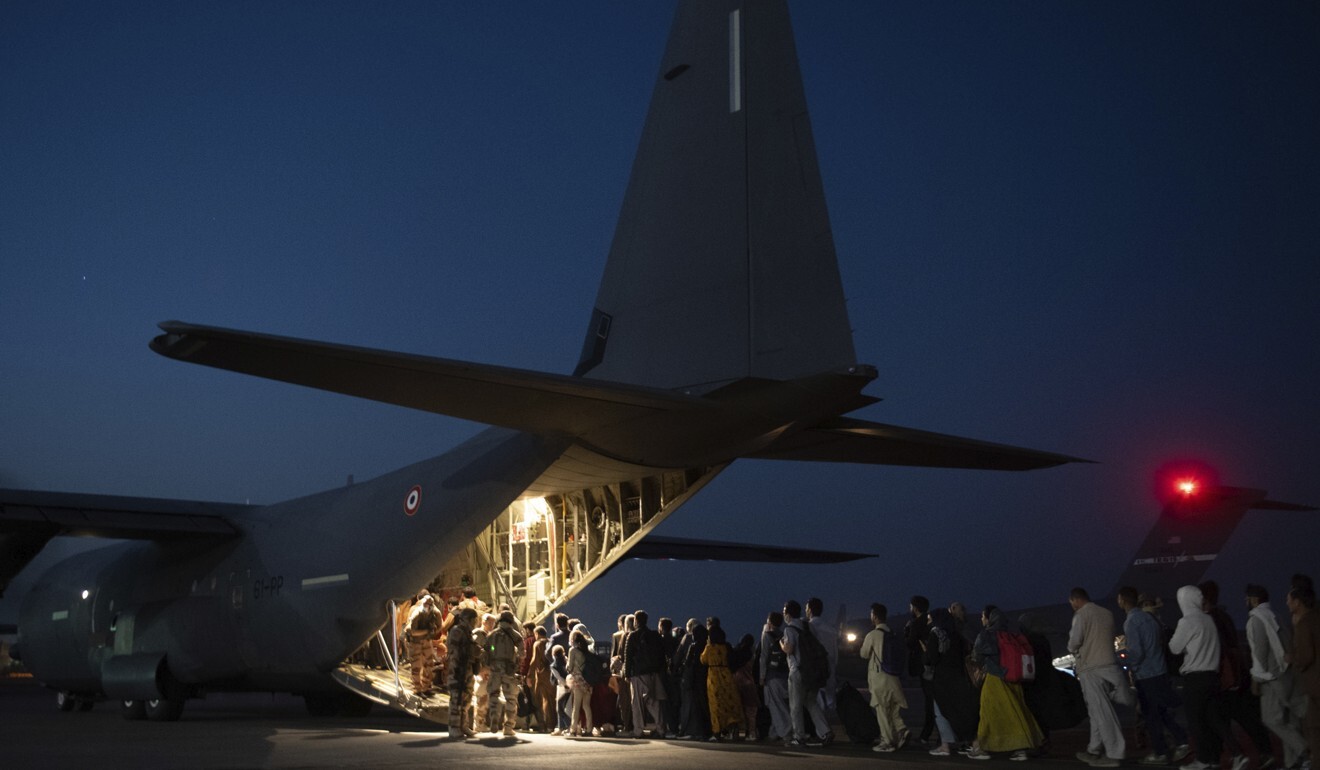
Fighters claiming allegiance to Isis-K first began appearing in eastern Afghanistan at the end of 2014 but the ultraradical Sunni movement soon expanded from the area near the border with Pakistan where it first appeared.
Daesh, as it is widely known in Afghanistan, established a reputation for extreme brutality as it fought the Taliban both for ideological reasons and for control of local smuggling and narcotics routes, according to Western intelligence services.
It also claimed a series of suicide attacks in cities like Kabul, where as well as government and civilian institutions, it particularly attacked targets associated with the Shiite religious minority.
Why is Isis silent on China’s Uygur Muslims, when US alleges genocide?
The US military has said it would prioritise evacuating its troops, numbering about 5,200, in the two days before the deadline to leave.
Biden said in his press conference that the entire chain of US military command “subscribe to the mission as designed to get as many people out as we can within the [August 31] timeframe” and will provide “whatever they need if they need additional force” to complete the evacuation.
Eurasia Group’s US practice managing director Jon Lieber said Biden was left with “two very bad options”, both “terrible for his domestic standing”.
“Leaving Americans behind is probably the worse long-term outcome, especially if [Isis] is able to operate freely inside the country and take American hostages, which today’s bombings potentially demonstrate, but staying past August 31 is going to result in more deaths in the near term,” Lieber said.
McKenzie said that as many as 1,000 American citizens remained in Afghanistan after the airlift had evacuated 4,500 since mid-August.
Additional reporting by Reuters


